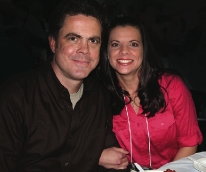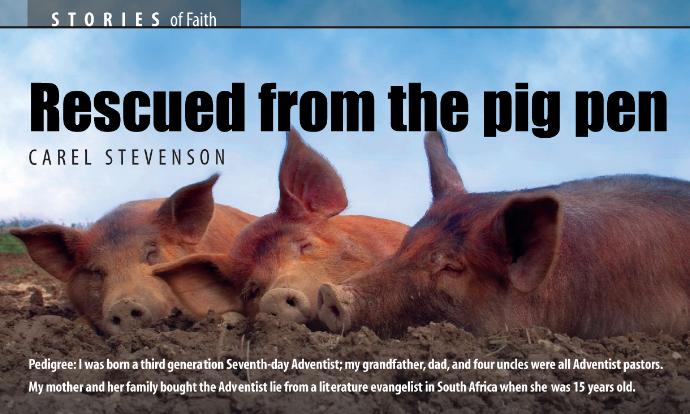HOME / PROCLAMATION! MAGAZINE / 2012 / SUMMER / FAITH STORY
S U M M E R • 2 0 1 2
VOLUME 13, ISSUE 2
D E P A R T M E N T S

Childhood
To my mother's credit, I learned to read from the Bible. While I did struggle with the old King James version that we had at home, I recall being attracted to Scripture, and by the age of six or seven I had prayed for Jesus to come into my heart and forgive me of my sins. Whether I was born again at that time or not is uncertain, but I felt a call on my heart to follow Jesus.
Unfortunately, the sufficiency of Scripture was not part of the Adventist program in our family, and I progressed into reading from household favorites such as Patriarchs and Prophets and The Great Controversy, to get the rest of the story. As I learned the Adventist doctrine of insecurity and its version of progressive sanctification, however, I became more and more saddened and discouraged. My reading of Scripture had sharpened my awareness of my own sin to such a degree that I knew I was incapable of achieving the righteousness required to stand before God when judged. At the same time, to my discredit, I believed what I was being taught without question, and the roots that I had been putting down into the soil of the word dried up.
I have learned only recently that when I was about seven my mother was already losing confidence in the authority of Ellen White; nevertheless, I was still raised from that time without any direction away from Adventist doctrine. Why? I am not sure, but perhaps her silence stemmed from her commitment to my dad or to her family—or maybe she felt as I have known other Adventists to feel: that there is room in "the Truth" for differences and that we all worship the same Jesus. Therefore, the rationalization goes, we are all sincere, and a loving God will see our sincerity and reward us accordingly.
Fallen away
The theology that I had developed was as follows. I knew I was a sinner and had found myself incapable of being without sin. That was accurate as far as it went—but I learned that I would have to face judgment one day for each of my sins. At its root this belief taught me that I was responsible for my salvation. Moreover, within my Adventist training, Satan had been elevated to a nearly god-like being with the power to create certain life forms, and I learned that serving him was the alternative to serving God. After all, the Bible made it clear that there are only two alternatives when Jesus said in Matthew 12:30, "Whoever is not with me is against me…"
In addition, my understanding of the final judgment and hell was that I would be consumed and annihilated. I eventually grew to accept that, since I was hopelessly sinful, I would serve myself and Satan, finding as much pleasure as available to me, and ultimately burn for a little while in hell. This fate compared to the futile life of attempting to obey an impossible law seemed to be the lesser of miseries.
15 years in the pigpen
I spent the next 15 years in the pig pen of the world. These years of abandonment to my sinful nature led me to a couple of rehabilitation centers, to dealing with disease, and to a couple of times in jail for multiple felonies.
While none of these results was pleasant, they are not what I remember as the worst experience of that time. I remember the searing pain of living in a place of what I can only imagine some of the agony of hell to be. My heart had become isolated from God. I was completely without hope.
Through a series of events in my life that I believe the Lord arranged, I called on my parents for help to pull my life together. I was determined to join society and live productively, but I did not turn from my life of sin.
Some years later through the working of the Holy Spirit, I began to be aware that while my life was staying together externally, I was miserable—and everything in which I was involved would at best only distract me temporarily. I began to pray. This was a strange experience for me. Because of my past assumption that I was abandoning myself to serving Satan, I would pray that the God of Abraham, Isaac, and Jacob would hear my prayer, because I needed to be clear with all listening that I was communicating with God.
Still believing that the true church was the Adventist religion, that is where I returned. After a few years I had settled in and was finding my place in the church and was even ordained as an elder, but I still knew that I was not going to be saved. I knew that the life of a productive church-going citizen was better than where I had been, but I had not found anything of eternal value.
The road to freedom
Then, as I started to look at things from a perspective of allowing myself to believe that the Adventist religion may have gotten some things wrong, everything began to change. My heart was being convicted by Jesus even while I was half-heartedly participating at our church. My dad had given me a set of tapes by Pastor Chuck Missler. He gave them to me because of the engineering bent that characterizes Missler's presentations, and he knew I would enjoy them. What I suspect he didn't predict was that I would hear the gospel of our Lord Jesus Christ and became dogmatically convicted that Scripture is the inerrant word of God that contains all that we need. The truth began to work in my heart, and I began to perceive cognitively that salvation could never be based on my merit.
Still, a couple years passed, and to my shame I thought, "Well, I don't believe everything Adventism teaches, but every church has its problems and takes things too far at times." I did not know what I didn't know.
But then I was given a son and was faced with the thought of raising my boy in a religion that I did not believe, a religion that had led me to throw so much of my life away. At that time two books were significant for me. The first was Choosing Your Faith by Mark Mittelberg. When I read that, it seemed that for the first time I realized that my religion should be my choice, and a shift took place in my thinking that opened the door for me to read the next book, Truth Led Me Out by our beloved pastor Dale Ratzlaff. Within a month we attended Trinity for the first time, and then we experienced our first Former Adventist Fellowship (FAF) weekend followed by becoming part of the FAF Friday night Bible studies and, of course, Sunday FAF lunch.
The process of integrating into this new Christian community seemed at times to progress more slowly for me than it did for my wife, but as I read and heard Scripture, it did its work in my heart. There have been layers of bad doctrine and lack of trust in my security in Christ that the word has had to remove, but I now know that I am saved by grace alone through faith alone in Jesus Christ my Lord.
Ministry
As I have shared my new faith with others, one of the common responses from both Adventists and from Christians who disagree with my efforts to discredit Adventist doctrine is that they believe the differences between Adventism and Christianity are minor, that we are all part of the same family serving the same Jesus, and that we are making too big a deal about minor issues.
Such assessments are not the case.
The true Adventist doctrine puts me back under the old covenant and under the law of death according to Galatians.
Adventism declares that I am not saved until the end of the investigative judgment; the implicit meaning of this doctrine is that when Jesus said, "It is finished," it wasn't.
It makes Satan the scapegoat and therefore the one who will ultimately bear my sins and their punishment instead of my Lord Jesus on the cross.
It makes me essentially a body rather than a spirit with a body, and it puts me in the grave at death rather than with the Lord.
It once gave me peace in my sin because it taught me that hell wouldn't be "that bad". I now rejoice in Christ's mercy that has rescued me from eternal punishment and separation from God.
Moreover, to put it mildly, Adventist doctrine modifies the Jesus of the Bible.
These non-orthodox doctrinal errors all have their origin in or are supported by the writings of Ellen G. White, and because fundamental Adventists, as were my parents, venerate her writings on a level with Scripture, the religion must be labeled as a cult.
Is Christianity inclusive enough for this religion?
In Matthew 7:13-14 Jesus said, "Enter by the narrow gate. For the gate is wide and the way is easy that leads to destruction, and those who enter by it are many. For the gate is narrow and the way is hard that leads to life, and those who find it are few."
If we are in positions of teaching our children truth or of defending our church family against the proselytizing evangelistic efforts of Adventists, we have a God-given responsibility not to withhold what we know but must contend for the faith and the true gospel of Jesus. It's a matter of eternal life and death. †

Copyright 2012 Life Assurance Ministries, Inc., Casa Grande, Arizona, USA. All rights reserved. Revised July 2, 2012. Contact email: proclamation@gmail.com
Carel Stevenson is freed by Christ from a multi-generational heritage of Adventism that includes his dad, grandfather, and four uncles, all pastors in the Seventh-day Adventist religion. Carel, who attended Walla Walla University and graduated from Cal Poly Pomona, is a structural engineer who desires to share the Truth with other Seventh-day Adventists and currently serves on the board of Life Assurance Ministries. He and his wife Nicole have two children: Joshua, 5, and Abigail, 3, and the four of them attend Trinity Church in Redlands, California.

